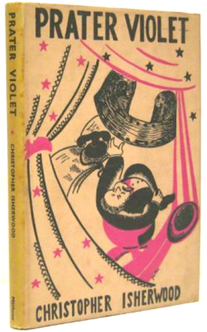A WRITER'S WIT |
My Book World
I'VE MADE IT MY GOAL to read the entire oeuvre of late Anglo-American author, Christopher Isherwood, over a twelve-month period. This profile constitutes the tenth in a series of twenty.

New York: Random, 1945.
Prater Violet is a short novel about the film industry of 1933 London. The movie being made, Prater Violet, is set in pre-1914 Vienna, where a young woman named Toni sells violets in the streets. Soon she meets a handsome young man, who, at first, seems like a student but turns out to be Rudolf, the Crown Prince of Borodania. As Isherwood does in other fictional works, his persona becomes a character in this work. The novel draws upon his experience as a scriptwriter, a role that he will later continue in Hollywood. As always, he has a sharp eye for telling details. In this passage, he describes the director with whom the fictional Christopher must work, Friedrich Bergmann:
“Bergmann’s strong, hairy, ringless hand rested on the table. He held his cigarette like an accusing forefinger, pointed straight at Chatsworth’s heart. His head was magnificent, and massive as sculptured granite. The head of a Roman emperor, with dark old Asiatic eyes. His stiff drab suit didn’t fit him. His shirt collar was too tight. His tie was askew and clumsily knotted. Out of the corner of my eye, I studied the big firm chin, the grim compressed line of the mouth, the harsh furrows cutting down from the imperious nose, the bushy black hair in the nostrils. The face was the face of an emperor, but the eyes were the dark mocking eyes of his slave—the slave who ironically obeyed, watched, humored and judged the master who could never understand him; the slave upon whom the master depended utterly for his amusement, for his instruction, for the sanction of his power; the slave who wrote the fables of beasts and men.”
Moreover, he slyly indicates that the “Christopher Isherwood” of the novel is homosexual but never, of course, uses any such language:
“But there was a little waiter who, for some reason, had taken a fancy to me. We always exchanged a few words when I came in. One day, when I was sitting in a large group and had ordered, as usual, the cheapest item on the menu, he came up behind my chair and whispered, ‘Why not take the Lobster Newburg, sir? The other gentlemen have ordered it. There’ll be enough for one extra. I won’t charge you anything.’”
Or consider this passage:
“Love had been J. for the last month—ever since we met at that party. Ever since the letter which had arrived next morning, opening the way to the unhoped-for, the unthinkable, the after-all-quite-thinkable and, as it now seemed, absolutely inevitable success of which my friends were mildly envious. Next week, or as soon as my work for Bulldog was finished, we should go away together. To the South of France, perhaps. And it would be wonderful. We would swim. We would lie in the sun. We would take photographs. We would sit in the café. We would hold hands, at night, looking out over the sea from the balcony of our room. I would be so grateful, so flattered, and I would be damned careful not to show it. I would be anxious. I would be jealous. I would unpack my box of tricks, and exhibit them, once again. And, in the end (the end you never thought about), I would get sick of the tricks, or J. would get sick of them. And very politely, tenderly, nostalgically, flatteringly, we we would part. We would part, agreeing to be the greatest friends always. We would part, immune, in future, from that particular toxin, that special twinge of jealous desire, when one of us met the other, with somebody else, at another party.”
“We had written each other’s part, Christopher’s Friedrich, Friedrich’s Christopher, and we had to go on playing them, as long as we were together . . . [f]or beneath our disguises, and despite all the kind-unkind things we might ever say or think about each other, we knew. Beneath outer consciousness, two other beings, anonymous, impersonal, without labels, had met and recognized each other, and had clasped hands. He was my father. I was his son. And I loved him very much.”
NEXT TIME: New Yorker Fiction 2016

Introduction to My Long-Playing Records
"My Long-Playing Records" — The Story
"A Certain Kind of Mischief"
"Ghost Riders"
"The Best Mud"
"Handy to Some"
"Blight"
"A Gambler's Debt"
"Tales of the Millerettes"
"Men at Sea"
"Basketball Is Not a Drug"
"Engineer"
"Snarked"
"Killing Lorenzo"
"The Age I Am Now"
"Bathed in Pink"
Listen to My Long-Playing Records Podcasts:
"A Certain Kind of Mischief"
"The Best Mud"
"Handy to Some"
"Tales of the Millerettes"
"Men at Sea"
"My Long-Playing Records"
"Basketball Is Not a Drug"
"Snarked"
"Killing Lorenzo"
"Bathed in Pink"
Also available on iTunes.


 RSS Feed
RSS Feed